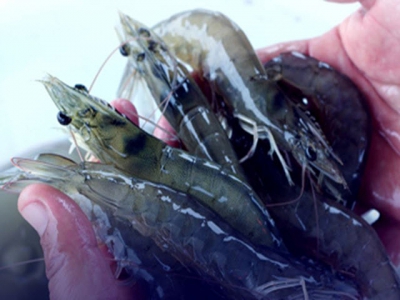Ecuadors Sustainable Shrimp Partnership moves forward with creating shrimp-farming standar

The Sustainable Shrimp Partnership, an Ecuador-based certification system for shrimp aquaculture launched in March 2018, is pushing forward with developing the metrics for its certification.
Photo courtesy of Sustainable Shrimp Partnership
The group, founded by seven of Ecuador’s largest shrimp-farming companies, has partnered with the nonprofit Colombian Institute of Technical Standards and Certification (ICONTEC), which developed sustainability standards for the Colombian coffee industry, to produce validation metrics for the Sustainable Shrimp Partnership (SSP) standards. Those are based on the Aquaculture Stewardship Council standards, and include zero use of antibiotics, full traceability, and no negative impact on the local environment, as shown through a water-quality measure.
ICONTEC was chosen because of its expertise in developing practical metrics and protocols “which the global marketplace can depend upon,” Jose Antonio Camposano, the executive president of Ecuador’s National Chamber of Aquaculture, said in the release.
“As we prepare to take SSP shrimp to market, we are taking every step to ensure we not only have the highest levels of sustainability in our operations, but that we also have the most rigorous protocols in place to provide our customers and consumers complete trust that they are purchasing the highest-quality product,” Camposano said.
On 16 October, the SSP also announced the creation of a farm improvement program aimed at Ecuador’s small- and mid-size farms. The move is aimed at giving shrimp-growers with fewer resources access to knowledge and resources necessary to eventually obtain SSP certification, according to Camposano.
“We believe inclusion is critical to our success because if we only work with a small number of farms we will not see a significant change or have a significant impact on the wider industry,” he said. “Through this program we will provide small and mid-sized farms with access to the SSP technical knowledge and capacity to help them work towards the highest levels of environmental and social standards pioneered by the SSP.”
The initiative will be implemented with the assistance of IDH, a Dutch nonprofit working to increase sustainability in global trade, as well asthe World Wildlife Fund (WWF) and the Aquaculture Stewardship Council. The program will benchmark farm performance against a number of environmental and social indicators in order to establish their current performance, and then a create a personalized fish health and farm management improvement program intended to guide the farm to SSP certification standards.
WWF Aquaculture Lead Aaron McNevin said he expects the program to have a positive environmental impact on shrimp-farming conditions in Ecuador.
“It is important to have leadership initiatives such as SSP, but if they only work with a small number of farms their impact is limited,” McNevin said. “The SSP Improvers Program has the potential to touch a much larger segment of the shrimp farming sector which is ambitious but necessary.”
IDH Aquaculture Director Flavio Corsin said the move to greater inclusion will foster a culture of sustainability in Ecuador’s shrimp industry.
“What we see through the SSP is a drive to lift the whole industry,” Corsin said. “Through the improvement program we will be able to collect data from a large number of farms as to allow the industry to identify potential challenges and practices to address those challenges, both within farms and within the wider landscape. The program will not only improve a farm’s sustainability performance, but by improving fish health management practices will also make them more efficient, more cost-effective, and more attractive for investors.”
SSP said it hopes to see its initial participants in the program join it before the end of the year.
“This is an exciting time for SSP. This time last year we just had only our vision, but now we have an action plan and projects in place,” Camposano said. “We know that consumers want high-quality products produced to the highest standards and without the use of antibiotics; and we see it as part of SSP’s leadership role to get the race to the top started here in Ecuador.”
Có thể bạn quan tâm
 EMS impacts: Disease shifts shrimp supplies, prices, future production
EMS impacts: Disease shifts shrimp supplies, prices, future production Unaffected areas – Ecuador, Indonesia, India, Bangladesh and Myanmar – are rapidly expanding production
 A review of unit processes in RAS systems
A review of unit processes in RAS systems This column reviewed important unit processes in recirculating aquaculture system design and began to discuss components used to remove waste solids
 What to do about EMS/AHPN?
What to do about EMS/AHPN? A number of commonalities have been observed among occurrences of early mortality syndrome (EMS) or acute hepatopancreatic necrosis (AHPN) in shrimp